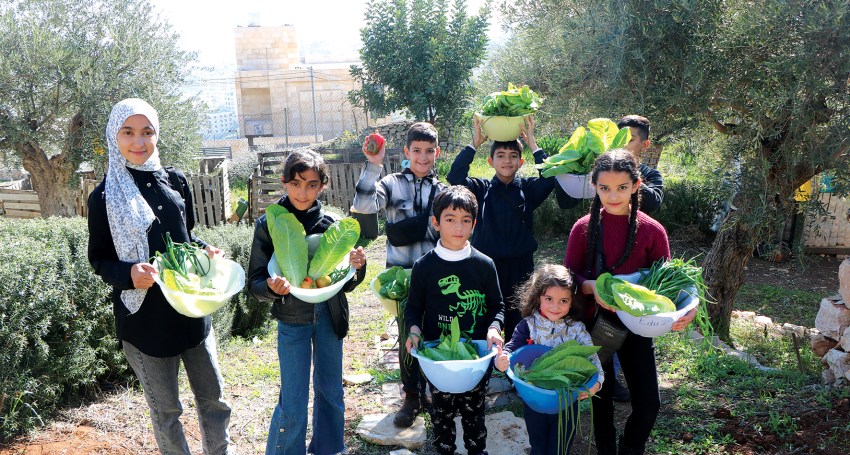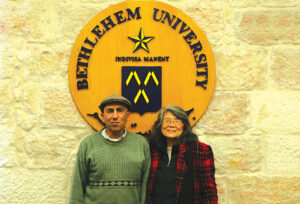Mother Nature’s great fight
International
When Professor Mazin Qumsiyeh took to the stage in Adelaide as guest speaker at a recent SA Interfaith Matters event, the Palestinian Christian ecologist spoke about the devastation of war, the importance of diversity and his own love of nature.

Prof Qumsiyeh visited Australia for the first time in April to connect with First Nations representatives, faith groups, ecologists and others working towards a global movement for peace, land rights and environmental justice.
The interfaith gathering was a collaboration between Interfaith Matters! Forum, Multifaith SA and Religions for Peace Australia. The theme was ‘Our Earth: how do we work together to heal the devastation of war and create hope for our children?’

Professor Mazin Qumsiyeh and his wife Jessie Chang.
Professor Qumsiyeh has a background in medical genetics and is founder and director of the Palestine Museum of Natural History (PMNH) and the Palestine Institute for Biodiversity and Sustainability in Bethlehem University where he also teaches.
The Institute is dedicated to research, education, and conservation efforts focused on the natural world, culture, and heritage.
“Tonight, I hope to convince you of why I am hopeful and why I am optimistic,” Professor Qumsiyeh said.
Advertisement
“Every place on earth is special but this place has a special history. Geographically, Palestine is an intersection of continents. It has special geographical and geological history and is very rich in biodiversity. We have more plant species in Palestine than there are in the United Kingdom. This rich biodiversity explains why Palestine became the first place on earth where humans domesticated animals and plants.”
The devastating effects of war on the climate and the environment are well documented.
“In the first two months, jets flying over Gaza and dropping bombs produced more greenhouse gasses than the Central African Republic as a whole country produced in a whole year,” Professor Qumsiyeh said.
“That’s not counting the effects of the explosions of actual bombs and the burning they cause. When you drop white phosphorus it leaves residue, and depopulating and destroying villages not only expels people but also removes domestic trees like figs and almonds, and wild trees like oaks and carobs. When trees are planted to replace them, they are not the right trees. Pine, for example, is more susceptible to fires.”
Advertisement
May 30 2024 marked the 10th anniversary of the founding of the Palestine Institute for Biodiversity and Sustainability.
In an ongoing attempt to make a positive impact on biodiversity, the Institute houses facilities including the Museum of Natural History, an ethnography exhibit, a herbarium unit, molecular and taxonomy laboratories, a taxidermy unit, a botanical garden, a community garden, permaculture facilities, children’s playground, an animal rehabilitation unit and a scientific library.
Professor Qumsiyeh developed a love for the nature of Palestine through his maternal uncle Dr Sana Atallah, the first Palestinian zoologist, who often took him on field trips as a child.
Tragically, Atallah was killed in a car accident at the age of 27, just as he began teaching in Iran after obtaining a PhD.

The Palestine Institute for Biodiversity and Sustainability in Bethlehem University.
The grief stricken young Mazin resolved to fulfill his uncle’s mission of researching mammals in the Arab world, and vowed to one day build a museum of natural history.
Undergraduate studies in Jordan University followed, as did Masters and PhDs from the United States. He researched bats, gerbils and jirds and wrote The Bats of Egypt (including Palestine, 1985) and Mammals of the Holy Land (1996). He was also trained in medical genetics in Memphis, Tennessee, and served on the faculties of medicine at three US universities (Tennessee, Duke, and Yale).
“We need to talk about solutions or therapies,” the Professor said.
“In medicine there are five pillars: taking a patient’s history, taking note of symptoms, making the right diagnosis, offer therapy (based on that diagnosis), and prognosis.”
In this case, he said therapy comes in the form of joy, hope, action, community, grace and ultimately becoming more human.
“Resistance is key to therapy, much like it is for diseases. We’re not going to give up, so we resist. We have a vision of sustainable human and natural communities.”
Key to that approach is diversity in all its forms.
“My mother is Lutheran, my father is Greek Orthodox, my sister went to Utah and became a Mormon, and 40 years ago I married a beautiful woman who is originally from China,” Professor Qumsiyeh said.
“Her family believes in Confucius ideologies and things like that. I have cousins who converted to Islam, and you could say I’m confused! If you think about it, what is wrong with diversity? It’s important. For the life of me, I don’t understand people who want to live with their own kinds or so to speak. It’s not healthy. Why would you only want to live with people just like you? I don’t, it would make life very boring. Diversity is strength, human diversity and biological diversity is strength.”
Plans for a new, improved facility are underway and the institute welcomes volunteers from abroad.
Onsite roles include outdoor activities such as working in the botanical garden and helping with animal rescue and rehabilitation. Volunteers can also help with research, conservation, and creating displays for the natural history museum.
Due to current travel restrictions, remote volunteer opportunities focus on research papers, writing and designing the website, and creating material for the exhibition rooms. When volunteering remotely, you can dedicate as much or as little time as you wish.











